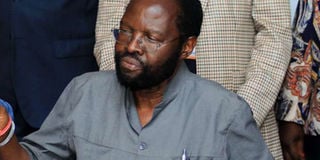Lake region bloc take-off imminent

Kisumu Governor Anyang’ Nyong’o speaks on the Lake Region Economic Bloc at Grand Royal Swiss Hotel Kisumu on November 9, 2017. He said elaborate plans are under way to make the economic bloc dream a reality. PHOTO | TONNY OMONDI | NATION MEDIA GROUP
What you need to know:
- Failure to achieve the bloc’s objectives has been blamed on lack of public participation and political goodwill.
- Prof Nyong’o said the legal framework for the bloc would be presented to county assemblies for enactment into law.
When President Uhuru Kenyatta launched the Lake Region Economic Bloc on April 2015, talk was rife that it heralded a new dawn for the counties.
Two years down the line, there is little to show on implementation of what is on paper, with a number of the ambitious projects proposed yet to kick off.
The bloc is made up of Bungoma, Busia, Homa Bay, Kakamega, Kisii, Kisumu, Migori, Nyamira, Siaya, Vihiga, Bomet, Trans Nzoia and Kericho counties.
VISION 2030
The proposal, developed with the support of Deloitte East Africa and Ford Foundation, aligns with the national development plans of Vision 2030, its Medium Term Plan II for 2013-17 as well as the County Integrated Development Plans.
The lake region counties resolved to focus on seven key areas of agriculture, tourism, education, health, Information and Communication Technology, financial services and infrastructure.
For instance, to expand on the dormant agricultural potential in Siaya, Homa Bay and Migori counties, which have large tracts of fallow and arable land, the plan called for initiation of massive irrigation projects.
AGRICULTURE
The main cash crops of the region are sugarcane, pyrethrum, tobacco, tea and cotton whereas dominant food crops are maize, rice, potatoes, vegetables, tomatoes, beans, millet and sorghum.
A segment of the population derives its livelihood predominantly from fishing in Lake Victoria, rivers Yala, Gucha and others.
On tourism and opportunities in the hospitality industry, the bloc officials underlined the need for undertaking aggressive marketing of the region to local and international markets.
Other critical issues like the establishment of specialist hospitals in every county under the proposed flagship project for health also just remain on paper.
HEALTH
Among others, the plan had it that Kisumu was to be the regional host of orthopaedic technologies, Kisii County to have a top cancer centre, whereas Kakamega was to have a centre of excellence in mental health.
Kisumu City Residents Voice chairman Audi Ogada blames failure to achieve the bloc’s objectives to lack of public participation and political goodwill.
“It is impractical to attain success while secluding residents in a programme they are expected to play an important role,” Mr Ogada told reporters recently.
“While the idea to pursue a stronger trade agreement is good, leaders need to come down to the people and get their views as demanded by the Constitution.”
ECONOMY
He called on all leaders to review their strategy in providing a foundation on which the economy of the region could be strengthened.
Mr Eddy Anayo, a Kisumu businessman, also called on leaders to speed up implementation, saying it would create a bigger market for products and services.
“As a person who engages in tourism business, the implementation of the project will give rise to an expanded market and more income,” he said.
Kisumu Governor Peter Anyang’ Nyong’o, who presided over the first meeting on November 9, said elaborate plans are under way to make the economic bloc dream a reality.
SUMMIT
Prof Nyong’o said the legal framework for the bloc would be presented to county assemblies for enactment into law by the end of the year.
Members of the summit renewed their commitment to building on the projects in progress, including the establishment of a regional bank.
While admitting that much was yet to be achieved towards attaining the region’s common goal, the governor said more needed to be done to benefit residents.
“The secretariat will disseminate the bloc’s agreement for signature by governors, while at the same time follow up on financial contributions by counties,” Prof Nyong’o said during a meeting of member counties at Grand Royal Swiss Hotel in Kisumu.
REVENUE
And this comes as a report by the controller of budget indicates that only two counties met their revenue collection targets in the last financial year.
Prof Nyong’o said the lakeside town would establish a secretariat for LREB at the devolved government offices, with staff seconded from the constituent counties as would be determined by the summit.
As a way of tackling challenges facing the sugar industry, the participants agreed to institute rapid response initiatives like write-off of taxes, re-engineering the management of factories, payment of arrears to farmers and staff as well as promoting sustainable cane production.
SUGARCANE
Council of Governors Agriculture Committee chairman Okoth Obado said the sugar industry was on the verge of collapse due to illegal imports.
“The industry has been affected by lack of regulations to curb sugar importation. The government needs to put an end to illegal importation and packaging of sugar,” Mr Obado said.
He proposed the privatisation of factories, gazettement of regulations and re-establishment of a fund as measures to revive the industry.
MILLERS
Mosop MP Vincent Tuwei urged the national government to introduce and enforce the 40-kilometre radius operation area for every sugar factory.
“The ministry needs to implement regulations to deal with millers collecting cane past the 40-kilometre operation radius,” Mr Tuwei told the gathering.
“Any factory collecting sugarcane beyond Cheswet and Awasi should be closed down.”
He said many towns that emerged during the “glory” days of vibrant sugar industry had collapsed due to lack of regulations.






